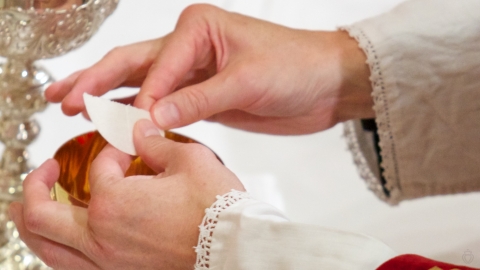The Passion of Jesus Christ in the Psalms (1)

The psalms draw an admirable and poignant portrait of the suffering of the Messiah. St. Pius X wrote in his Apostolic Constitution Divino afflatu: “The picture of Christ the Redeemer is lovingly traced through the words of the Psalms.” Once resurrected, Our Lord makes explicit reference to the psalms that describe His passion: “All things ,He said, must be fulfilled which are written in the las of Moses, and in the prophets, and in the psalms, concerning me” (Lk. 24: 44).
St. Robert Bellarmine, doctor if the Church at the end of the 16th century and the beginning of the 17th century, made a complete commentary over the entire Psalter, drawing on the Fathers of the Church, and the best exegetes. He showed how the psalms reveal the extent of the sufferings of Christ and the depth of His love for us: “The evangelists, he affirmed, to emphasize the constancy of Jesus Christ and the spontaneity of His Passion, make Him small to express the extent and the number of His wounds. The prophets Jeremiah, and Isaiah, teach us this in numerous places, but especially in the Psalmist: God allowed their revelations so that the world would not ignore how much it had been loved in the Passion of the Savior.” [1] Our Lord could never have endured all that He suffered, without His unspeakable love for His Father and for us. Let us ask Him for the grace to recognize during Holy Week, how much God love us, in order to give Him love for love.
The Plot Hatched Against Our Lord
Jealous of the authority of Our Lord and of His apostolic influence, Christ’s enemies decided to kill Him. Firstly, by their words, then by ordaining it. The Psalmist underlined this when he says: “The sons of men […] have for their tongue a sharp sword.” (Ps 56, 5)
In order to justify their decision, the princes of the priests and the elders looked for a witness. Psalms 26 and 34 state in these words: “Unjust witnesses have risen up against me; and their iniquity has lied to itself.” (Ps 26, 12) “Unjust witnesses rose up. They asked me things that I knew not. They repaid Me evil for good.” (Ps 34, 11) These false witnesses utter a deplorable word as specified in psalm 40. “They spoke an unjust word against me.” (Ps 40, 9) St. Thomas Aquinas comments on this verse in this way. “What is this wicked word?” “It is expedient for you that one man should die for the people, and that the whole nation does not perish […] From that day therefore they devised to put Him to death” (Jn. 11:50 and 53).
Without valid reason, Our Lord’s enemies ordained His death as the Psalmist foreshadowed: “Do not let my enemies wrongfully rejoice over me, who have hated me without cause” (Ps 34: 19). Our Lord applied this verse to Himself on St. John: “They hated Me for no reason” (Jn. 15:25).
Language is a sword which can cause the death of one’s neighbor by destroying their reputation. Alas! We can ruin someone’s reputation through backbiting or even slander. Also, let us resolve during this Holy Week to be more benevolent in our judgments and more reserves in our speech. Let us try and avoid the sin of envy if we do not want to fall into the same blindness of the high priests and the elders (Mt. 27:18).
The Unfolding of The Passion
The Passion of Our Lord is summarized in Psalm 109 which depicts the divinity of the Messiah and His humanity. Our Lord appears there as a priest: “You are a priest forever according to the order of Melchisedech.” (v. 4) and as a victim: “He shall drink of the torrent in the way; therefore, shall he lift up his head.” (v.7) This verse evokes the stream of Cedron, which Our Lord crosses after His arrest in the Garden of Olives. But this stream also symbolizes the sufferings that Our Lord will endure throughout His Passion. St. Gregory says that: “From the beginning of the world, the stream of death has flowed among men. As He tasted death for a time, Our Lord drank from this stream. And then He held His head high, lifting above the angels what death had laid down in the grave.” (Jacquet, p. 229)
1. The Agony
If the psalms show us divine justice and mercy through the plagues sent by God to punish man and to bring him back to Him, they also show these same divine attributes through the portrait they draw of the Messiah suffering. St. Paul says that « God did not spare His own Son but delivered Him for all of us” (Rm. 8:32). Thereby showing God’s justice who did not let sin go unpunished. But this gift of God is the fruit of His mercy as Our Lord said to Nicodemus: “For God so loved the world, as to give His only begotten Son that whoever believes in Him, may not perish but have everlasting life. For God did not send His Son into the world to judge the world, but that the world may be saved by Him” (Jn. 3:16-17).
Let us see how much Our Lord has manifested His love for us by transporting us in spirit to the Garden of Gethsemane. On the evening of Maundy Thursday, Christ endures a true agony. His suffering is so great that it leads Him to endure mortal turmoil and sadness. Psalm 54 portrays his agonies like this: “I was filled with sadness in my ordeal and trouble seized Me. Trouble seized me by the voice of the enemy and the oppression of the sinner, because they accused Me of crimes and, in their anger, they afflicted Me. My heart was troubled, and the fear of death fell upon Me. Fear and trembling seized Me and darkness enveloped Me” (Ps. 54:3-6).
Psalm 108 which describes the betrayal of Judas and the dramatic consequences of his sin, evokes the trouble endured by Our Lord as His Passion drew near and His imminent death: “Deliver Me, [O My Father], because I am poor and needy and my heart is troubled within me.” (Ps 108, 21-22) St. Robert Bellarmine comments on this passage as follows: “Christ said all this in order to show that He was truly man, and, ad such, had a horror of death absolutely considered, and as contrary to nature, while He actually longed for and desired the same death, as being the price settled and decreed by His Father for the redemption of mankind.”
Our Lord wanted to experience all kinds of suffering in order to allow us to sanctify them and overcome them. He felt anguish and deep sadness at the approach of death because of the fear that every man experiences when death approaches, but especially because of the eternal death that the sinner deserves and that Our Lord wanted him to avoid.
Indeed, the Passion of Our Lord was caused by our faults. It was especially during His agony that Our Lord bore the brunt of our sins. This explains this word of psalm 21 which at first seems mysterious: “Far from my salvation are the words of my sins” (Ps. 21:2). Eusebius of Caesarea comments on this verse saying that Out Lord used these terms for us, on our behalf. Our Lord in His Passion taking the place of the sinner, is likewise identified with sin. St. Paul expresses it by saying: “He who did not know sin, He has made sin for us, that we might be made the justice of God in Him” (2 Cor. 5:21). In addressing the Galatians, the Apostle clarifies the infamous nature of the torture of the cross that Our Lord is going to undergo: “Christ has redeemed us from the curse of the law, being made a curse for us” (Gal. 3:13).
The psalms manifest what this curse consists of with an image: “Your fury, [My God], has been heavy on me, and you have caused all your waves to pass over me” (Ps 87:7). St. Robert Bellarmine comments: “The prophet describes the Passion of the Savior and its extent in two figures. The first teaches us that the extent of the Passion was such that the Justice of God, angered at the prevarication of the human race, demanded it, a thought which should often be used for our meditations. The second depicts the Savior in His Passion as a man thrown into the sea, on which weighs all the waves of the ocean, and who is carried by their agitation and smashed on all the rocks. This is how all the sins, all the sufferings, fell on the Savior and overwhelmed Him.”
In Psalm 68, we find the same image of water which seems to engulf the Divine Master: “I am buried in a deep mud, where there is no bottom. I fell into the depths of the sea, and the storm overwhelmed me” (Ps. 68:3). The Passion of Christ is represented in the form of a about to drown. at that very moment, suffocating him, death reaches the vital parts of his being.
As we read this passage, let us think of praying for those who are experiencing a similar death from suffocation today, and also let us discern the depth of the love Our Lord who endured it to remove us form sin and lead us to Heaven.
2. The Scourging
During the second sorrowful mystery, we meditate om the scourging of Our Lord. This frightening torture was also foreshadowed in the psalms.
“Their scourges were gathered together upon Me, and they did not know” (Ps. 34:15). St. Augustine comments on this verse as follows: “Jesus Christ was scourged by the rods of the Jews, and He is scourged by the blasphemies of false Christians. They multiply the blows against the Lord their God, and they do not know it.”
“The workers have plowed my back [with lashes], they made long furrows there” (Ps. 128:3). Our Lord was struck like an animal or like the slaves. He has atoned for the impure faults by which man is reduced to the level of the animals, that is, reduced to a being without reason, a being who is slave to their passions.
The world today is wallowing in impurity. May the meditation of the Passion help us to mortify the senses by limiting in particular the use of technology.
3. Our Lord on the Cross
Psalm 21is so detailed on the sufferings endured by Our Lord in His Passion that Cassiodorus was able to say: “It would seem that it is less a prophesy than it is history.” “They pierced my hands and my feet, they have numbered my bones. […[ They parted my garment, and upon my vesture they cast lots” (Ps. 21:17 and 19). The hands and the feet of Our Lord were pierced with nails, and His enemies shared His clothes.
While revealing the sufferings endured by Our Lord, the Psalmist also describes the blasphemies which came from everywhere: “All they that saw Me have laughed me to scorn: they have spoken with the lips and wagged the head. He hoped in the Lord, let Him deliver Him; let Him save Him, seeing He loves Him” (Ps. 21:8-9). Psalms 68 and 105 take up the same idea.
In the face of such ingratitude and contempt, how does Our Lord react? Will he put them back in their place with appropriate words? Will he curse them? Well no. The Psalmist says: “Instead of having to love Me, they tore me apart with their slander; but I was content to pray” (Ps. 108:4). St. Robert Bellarmine explains this verse as follows: “Instead of returning evil for evil, Our Lord prayed to God for His enemies. This is what He did on the cross when He said: “Father, forgive them for they know not what they do.”
Psalm 21 expresses yet another very mysterious suffering, the abandonment of the Father: “My God, My God, look at Me, why have You forsaken Me” (Ps 21:2)? At the beginning of the first (word on the cross) and the last, Our Lord speaks to His Father; here he speaks to God. The paternal relationship has disappeared. Our Lord is as identified with sin. Now God and sin cannot coexist. By enduring this suffering, Our Lord has merited for us to recover the grace that makes us children of God, and that allows us to call God “Our Father.”
The fifth word of Our Lord on the cross expresses the intense thirst He endured. It was also foreshadowed “In My thirst, they gave Me vinegar” (Ps. 68:21). Finally, the last word of Jesus is a verse form Psalm 30: “In Your hands I put My spirit.” (Ps 30, 6) Our Lord put His spirit in the hands of His Father at the moment that He wanted Him to, which once again proves His Divinity
Fr. Patrick Troadec
[1] Commentary on Psalm 68, verse 1.
Related links
(Source : FSSPX – FSSPX.Actualités du 10/04/20)



